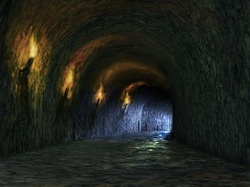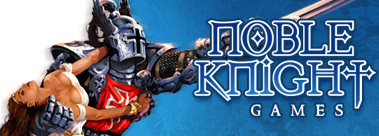
Grab your torches - and Light 'Em Up! The appointed date and time is upon us. Let the adventure begin...
Realms of Adventure is a play-by-blog roleplaying game. For many of you - this may be a new concept. Simply put - combine the best parts of gaming around the table with your friends, with your dream of being a fantasy novelist, and throw in a dash of rules to keep everyone (basically) honest. And there you have it!
Before venturing into 'The Secret Vaults of Kas the Betrayer' it would be wise to review the pages detailing Game Play and The Rules. For time pressed adventurers here's a run down... Read More...
Realms of Adventure is a play-by-blog roleplaying game. For many of you - this may be a new concept. Simply put - combine the best parts of gaming around the table with your friends, with your dream of being a fantasy novelist, and throw in a dash of rules to keep everyone (basically) honest. And there you have it!
Before venturing into 'The Secret Vaults of Kas the Betrayer' it would be wise to review the pages detailing Game Play and The Rules. For time pressed adventurers here's a run down... Read More...
How does the game progress?
The Game Master writes a blog post which includes a description of the location, any items or objects of interest, any creatures or non-player characters in the scene, and any possible (easily visible) exists. Players submit comments to the blog post, which describe the action performed during the Turn. Several Rounds may pass before the encounter is resolved.
What is a Round and a Turn?
A Round ends when every Player completes a single Turn. The Game Master also gets a turn to control creatures, non-player characters, and environmental changes.
During their Turn a Player may choose to do the following:
1) Perform a single Action - (may be swapped for another move)
Example actions:
a. Attack (melee, ranged, magic)
b. Standard Actions (such as open a chest)
c. Use Items (such as a healing potion)
- typically no Action Score, but does require time for the Character to perform
2) Make a Movement
Movement is restricted to the total Movement Points allowed per Character
Players explain their movement with start and end positions (Example: A1 to A5)
What should the comment include?
Player comments should be written in narrative form, and should include an Action Score at the end of the comment. Include the specific Attributes, Skills, Spells, and/or Equipment used to perform the action. These details are used to calculate the Player's Action Score. Clearly display these details in the Player Comment.
What is an Action Score, and Difficulty Score?
Action Score: Based upon the Declared Action, the Player will inform the Game Master of the total Action Score based on the Player's Attribute Ranks, Skill Ranks, Spell Ranks, and Equipment Ranks associated with the Declared Action.
Difficulty Score: Every obstacle - combative creature, physical terrain, mechanical puzzle, or magical barrier - has it's own Difficulty Score set by the Game Master. The Game Master will compare your Action Score against the Difficulty Score to see if you succeed.
Can you give a simple example?
Declared Action: Tawlok kneels at the Ornate War Chest to focus on Lockpicking while unpacking his Locksmith Kit!
Action Score: Unlock Chest = 'Lockpicking +2' + 'Apprentice Locksmith Kit +1' totals THREE (3)
Difficulty Score: Ornate War Chest = 9 Difficulty Score - - A Failure this attempt, worth 0:15 Focus Time Minutes
How long does a Turn last?
A maximum of two days is allowed for Players to post a comment. After that time - the Game Master will take a Turn. Initiative is determined by the order in which blog comments are received.
How does an Encounter end?
The Encounter ends when Players resolve the major conflict of the scene, or exit the space provided. A new blog post will be created by the Game Master which will begin the next Encounter in the storyline.
Do we roll dice?
No! A goal of the Action Score based system is to simplify the game so Players can give more attention to roleplaying and writing. Focus Time based character advancement is also a major shift away from statistics toward narrative focused gaming.
So... Light 'Em Up!
Grab your torches - light 'em up - and let's enter together into the fabled lands which encompass the Realms of Adventures!
The Game Master writes a blog post which includes a description of the location, any items or objects of interest, any creatures or non-player characters in the scene, and any possible (easily visible) exists. Players submit comments to the blog post, which describe the action performed during the Turn. Several Rounds may pass before the encounter is resolved.
What is a Round and a Turn?
A Round ends when every Player completes a single Turn. The Game Master also gets a turn to control creatures, non-player characters, and environmental changes.
During their Turn a Player may choose to do the following:
1) Perform a single Action - (may be swapped for another move)
Example actions:
a. Attack (melee, ranged, magic)
b. Standard Actions (such as open a chest)
c. Use Items (such as a healing potion)
- typically no Action Score, but does require time for the Character to perform
2) Make a Movement
Movement is restricted to the total Movement Points allowed per Character
Players explain their movement with start and end positions (Example: A1 to A5)
What should the comment include?
Player comments should be written in narrative form, and should include an Action Score at the end of the comment. Include the specific Attributes, Skills, Spells, and/or Equipment used to perform the action. These details are used to calculate the Player's Action Score. Clearly display these details in the Player Comment.
What is an Action Score, and Difficulty Score?
Action Score: Based upon the Declared Action, the Player will inform the Game Master of the total Action Score based on the Player's Attribute Ranks, Skill Ranks, Spell Ranks, and Equipment Ranks associated with the Declared Action.
Difficulty Score: Every obstacle - combative creature, physical terrain, mechanical puzzle, or magical barrier - has it's own Difficulty Score set by the Game Master. The Game Master will compare your Action Score against the Difficulty Score to see if you succeed.
Can you give a simple example?
Declared Action: Tawlok kneels at the Ornate War Chest to focus on Lockpicking while unpacking his Locksmith Kit!
Action Score: Unlock Chest = 'Lockpicking +2' + 'Apprentice Locksmith Kit +1' totals THREE (3)
Difficulty Score: Ornate War Chest = 9 Difficulty Score - - A Failure this attempt, worth 0:15 Focus Time Minutes
How long does a Turn last?
A maximum of two days is allowed for Players to post a comment. After that time - the Game Master will take a Turn. Initiative is determined by the order in which blog comments are received.
How does an Encounter end?
The Encounter ends when Players resolve the major conflict of the scene, or exit the space provided. A new blog post will be created by the Game Master which will begin the next Encounter in the storyline.
Do we roll dice?
No! A goal of the Action Score based system is to simplify the game so Players can give more attention to roleplaying and writing. Focus Time based character advancement is also a major shift away from statistics toward narrative focused gaming.
So... Light 'Em Up!
Grab your torches - light 'em up - and let's enter together into the fabled lands which encompass the Realms of Adventures!




 RSS Feed
RSS Feed
